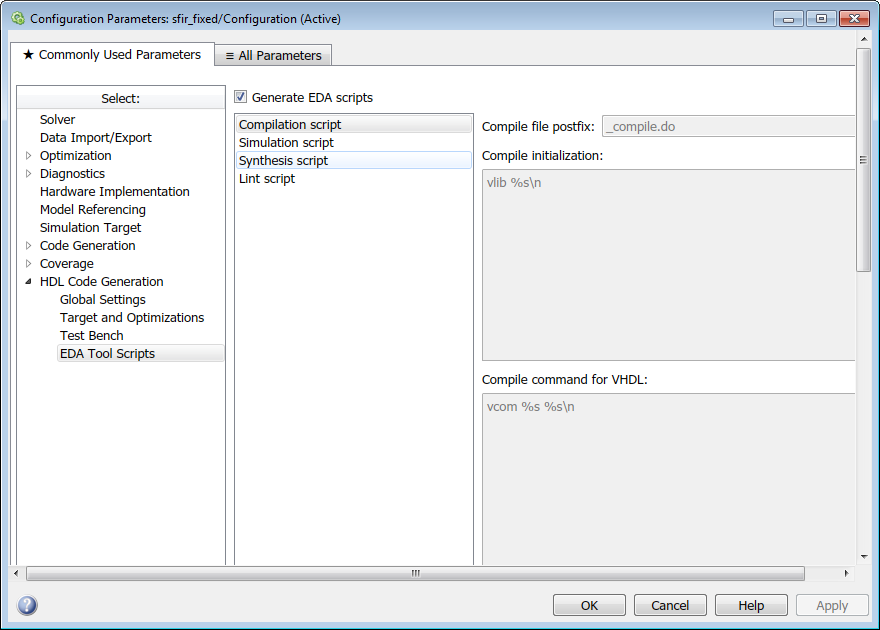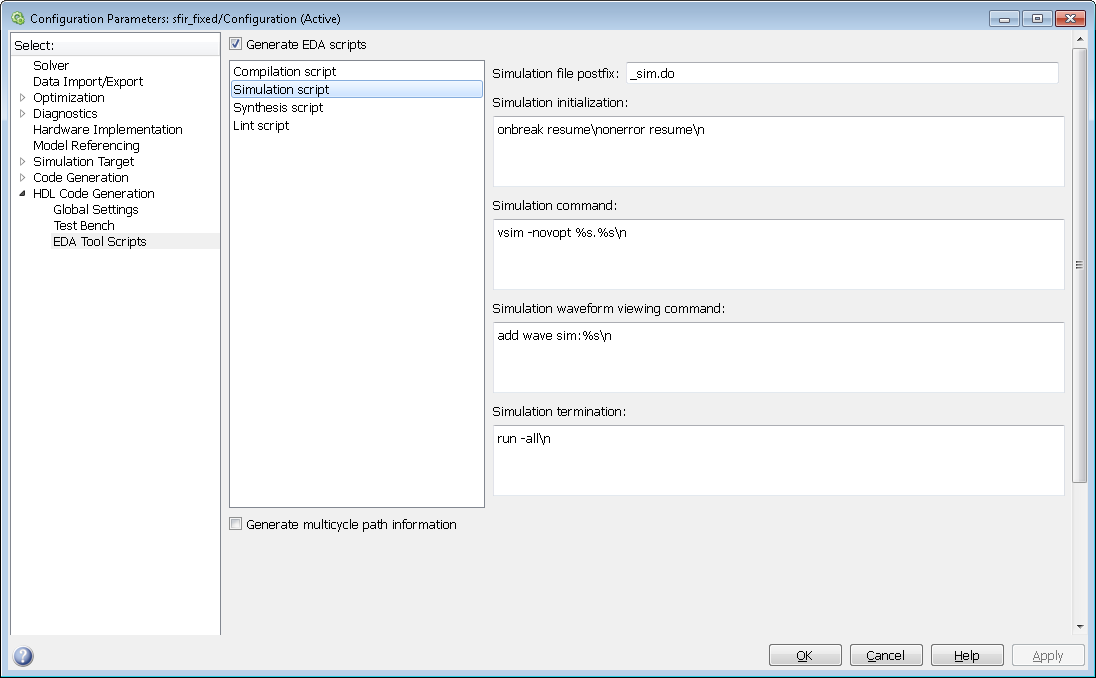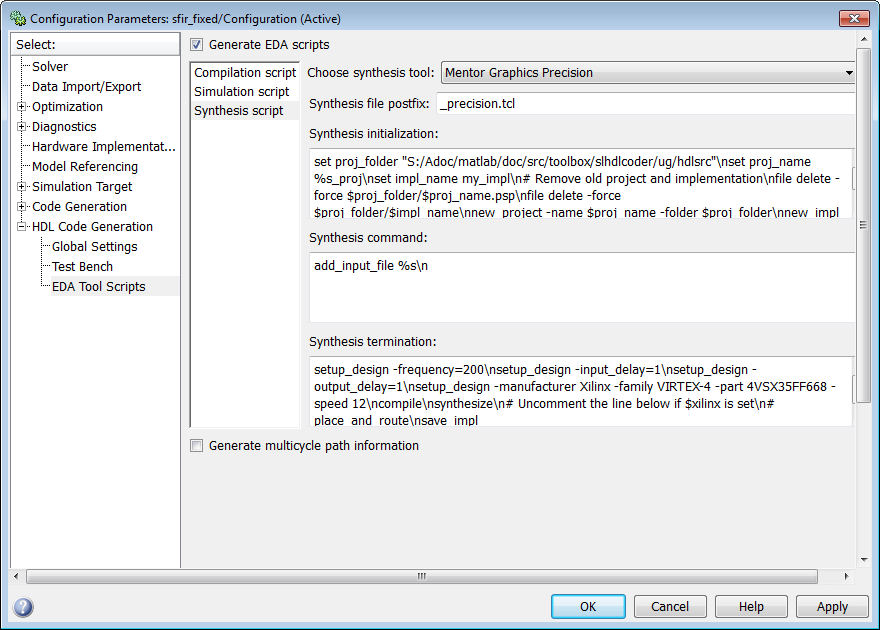Configure Compilation, Simulation, Synthesis, and Lint Scripts
You set options that configure script file generation on the EDA Tool Scripts pane. These options correspond to the properties described in Properties for Controlling Script Generation.
To view and set EDA Tool Scripts options:
Open the Configuration Parameters dialog box.
Select the HDL Code Generation > EDA Tool Scripts pane.

The Generate EDA scripts option controls the generation of script files. By default, this option is selected.
If you want to disable script generation, clear this check box and click Apply.
The list on the left of the EDA Tool Scripts pane lets you select from several categories of options. Select a category and set the options as desired. The categories are:
Compilation script: Options related to customizing scripts for compilation of generated VHDL® or Verilog® code. See Compilation Script Options for further information.
Simulation script: Options related to customizing scripts for HDL simulators. See Simulation Script Options for further information.
Synthesis script: Options related to customizing scripts for synthesis tools. See Synthesis Script Options for further information.
Compilation Script Options
The following figure shows the Compilation script pane, with options set to their default values.

The following table summarizes the Compilation script options.
| Option and Default | Description |
|---|---|
Compile file postfix'
| Postfix appended to the DUT name or test bench name to form the script file name. |
Name: Compile initialization Default: | Format name passed to fprintf to write
the Init section of the compilation script. The
argument is the contents of the VHDLLibraryName property,
which defaults to'work'. You can override the default Init 'vlib
work\n' by changing the value of VHDLLibraryName. |
Name: Compile command for VHDL Default: | Format name passed to fprintf to write
the Cmd section of the compilation script for VHDL files.
The two arguments are the contents of the SimulatorFlags property
option and the filename of the current entity or module. To omit
the flags, set SimulatorFlags to '' (the
default). |
Name: Compile command for Verilog Default:
| Format name passed to fprintf to write
the Cmd section of the compilation script for Verilog files.
The two arguments are the contents of the SimulatorFlags property
and the filename of the current entity or module. To omit the flags,
set SimulatorFlags to '' (the
default). |
Name: Compile termination Default: | Format name passed to fprintf to write
the termination portion of the compilation script. |
Simulation Script Options
The following figure shows the Simulation script pane, with options set to their default values.

The following table summarizes the Simulation script options.
| Option and Default | Description |
|---|---|
Simulation file postfix
| Postfix appended to the model name or test bench name to form the simulation script file name. |
Simulation initialization Default: ['onbreak resume\nonerror resume\n'] | Format name passed to fprintf to write
the initialization section of the simulation script. |
Simulation command Default: | Format name passed to If your The second implicit argument is the top-level module or entity name. |
Simulation waveform viewing command Default: | Format name passed to fprintf to write
the simulation script waveform viewing command. The top-level module
or entity signal names are implicit arguments. |
Simulation termination Default: | Format name passed to fprintf to write
the Term portion of the simulation script. |
Synthesis Script Options
The following figure shows the Synthesis script pane,
with options set to their default values. The Choose synthesis
tool property defaults to None,
which disables generation of a synthesis script.

To enable synthesis script generation, select a synthesis tool from the Choose synthesis tool menu.
When you select a synthesis tool, HDL Coder™:
Enables synthesis script generation.
Enters a file name postfix (specific to the chosen synthesis tool) into the Synthesis file postfix field.
Enters strings (specific to the chosen synthesis tool) into the initialization, command, and termination fields.
The following figure shows the default option values entered for the Mentor Graphics® Precision tool.

The following table summarizes the Synthesis script options.
| Option Name | Description | ||||||||
|---|---|---|---|---|---|---|---|---|---|
Choose synthesis tool |
| ||||||||
Synthesis file postfix | Your choice of synthesis tool sets the postfix for generated synthesis file names to one of the following:
| ||||||||
Synthesis initialization | Format name passed to fprintf to write
the Init section of the synthesis script. The default
string is a synthesis project creation command. The implicit argument
is the top-level module or entity name. The content of the string is specific to the selected synthesis tool. | ||||||||
Synthesis command | Format name passed to fprintf to write
the Cmd section of the synthesis script. The implicit
argument is the file name of the entity or module.The content of the string is specific to the selected synthesis tool. | ||||||||
Synthesis termination | Format name passed to fprintf to write
the Term section of the synthesis script.The content of the string is specific to the selected synthesis tool. |